新目标九年级Unit 2 I used to be afraid of the dark.
九年级英语I-used-to-be-afraid-of-the-dark课件2
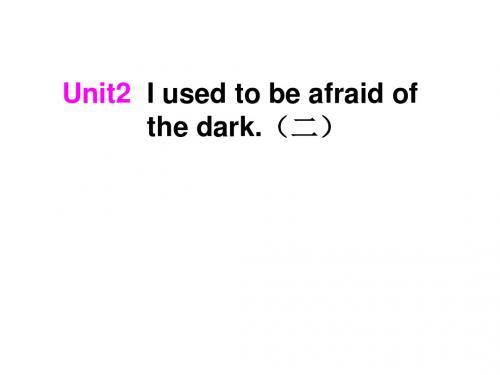
Activity eat
Past
Now
read
watch on TV do at school
; http;/// 果博东方上网导航; http;/// 果博东方上网导航; http;/// 果博东方 上网导航; http;/// 果博东方上网导航; http;/// 果博东方上网导航 jch81kcf
• Writing
Here is a list of things many people are afraid of. Which of these things did you use to be afraid of? Which ones are you still afraid of? put checks in the first two columns.
• Speaking
Ask your partner. A: Did you use to be afraid of the dark? B: Yes, I did. A: Are you still afraid of the dark? B: No, I’m not. How about you? A: Me? Oh, yes! I’m terrified of the dark. B: So, what do you do about it? A: I go to sleep with my bedroom light on.
My partner used to be afraid of… a. the dark b. being alone c. snakes d. flying in an airplane e. big dogs f. high places g. speaking in front of a group is still afraid of …
人教新目标九年级英语Unit 4 I used to be afraid of the dark知识点汇总
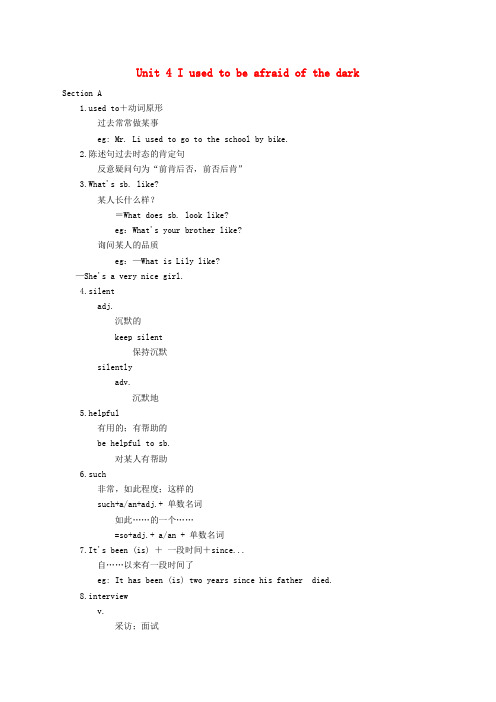
Unit 4 I used to be afraid of the dark Section Aed to+动词原形过去常常做某事eg: Mr. Li used to go to the school by bike.2.陈述句过去时态的肯定句反意疑问句为“前肯后否,前否后肯”3.What's sb. like?某人长什么样?=What does sb. look like?eg:What's your brother like?询问某人的品质eg:—What is Lily like?—She's a very nice girl.4.silentadj.沉默的keep silent保持沉默silentlyadv.沉默地5.helpful有用的;有帮助的be helpful to sb.对某人有帮助6.such非常,如此程度;这样的such+a/an+adj.+ 单数名词如此……的一个……=so+adj.+ a/an + 单数名词7.It's been (is) +一段时间+since...自……以来有一段时间了eg: It has been (is) two years since his father died.8.interviewv.采访;面试n.面试;访谈句型interview sb.采访某人interview sb. about sth.就某事采访某人have an interview with sb.采访某人interviewer面试者9.take up开始从事eg:When did he take up football?占用,花去eg:The work took up all his time.10.deal with应付;处理deal过去式dealt过去分词dealt与how 搭配处理eg: How do you deal with the matter ?11.dare敢于;胆敢dare to do sth.敢于做某事12.a small number of一小部分eg:A small number of students walk to school every day.辨析a number of许多+n复数作主语时,谓语动词用复数eg: A number of people have left early.the number of……的数量+n复数作主语时,谓语动词用单数eg:The number of the books in the library reaches 3, 000.e句型used to do sth.(过去)常常做某事否定式didn't use to/usedn't tobe used to doing sth.习惯于做某事14.publicadj.公开的n.民众=in public公开地;在别人(尤指生人) 面前the public公众;民众Section B1.all the time一直;始终多置于句末time短语in time及时on time准时many times多次ahead of time提前by the time到……的时候2.always总是;永远表示动作重复、状态持续3.be nervous about对……很紧张4.fail不及格;失败;未能(做到)fail in sth.反:succeed in sth.在某方面失败fail to do sth.未做成某事5.be proud of为……骄傲;感到自豪= take pride in6.in the last few years在过去的几年里Section Aed to+动词原形过去常常做某事eg: Mr. Li used to go to the school by bike.2.陈述句过去时态的肯定句反意疑问句为“前肯后否,前否后肯”3.What's sb. like?某人长什么样?=What does sb. look like?eg:What's your brother like?询问某人的品质eg:—What is Lily like?—She's a very nice girl.4.silentadj.沉默的keep silent保持沉默silentlyadv.沉默地5.helpful有用的;有帮助的be helpful to sb.对某人有帮助6.such非常,如此程度;这样的such+a/an+adj.+ 单数名词如此……的一个……=so+adj.+ a/an + 单数名词7.It's been (is) +一段时间+since...自……以来有一段时间了eg: It has been (is) two years since his father died.8.interviewv.采访;面试n.面试;访谈句型interview sb.采访某人interview sb. about sth.就某事采访某人have an interview with sb.采访某人interviewer面试者9.take up开始从事eg:When did he take up football?占用,花去eg:The work took up all his time.10.deal with应付;处理deal过去式dealt过去分词dealt与how 搭配处理eg: How do you deal with the matter ?11.dare敢于;胆敢dare to do sth.敢于做某事12.a small number of一小部分eg:A small number of students walk to school every day.辨析a number of许多+n复数作主语时,谓语动词用复数eg: A number of people have left early.the number of……的数量+n复数作主语时,谓语动词用单数eg:The number of the books in the library reaches 3, 000.e句型used to do sth.(过去)常常做某事否定式didn't use to/usedn't tobe used to doing sth.习惯于做某事14.publicadj.公开的n.民众=in public公开地;在别人(尤指生人) 面前the public公众;民众Section B1.all the time一直;始终多置于句末time短语in time及时on time准时many times多次ahead of time提前by the time到……的时候2.always总是;永远表示动作重复、状态持续3.be nervous about对……很紧张4.fail不及格;失败;未能(做到)fail in sth.反:succeed in sth.在某方面失败fail to do sth.未做成某事5.be proud of为……骄傲;感到自豪= take pride in6.in the last few years在过去的几年里。
部编人教版九年级英语全一册 17 Unit4 I used to be afraid of the dark A2
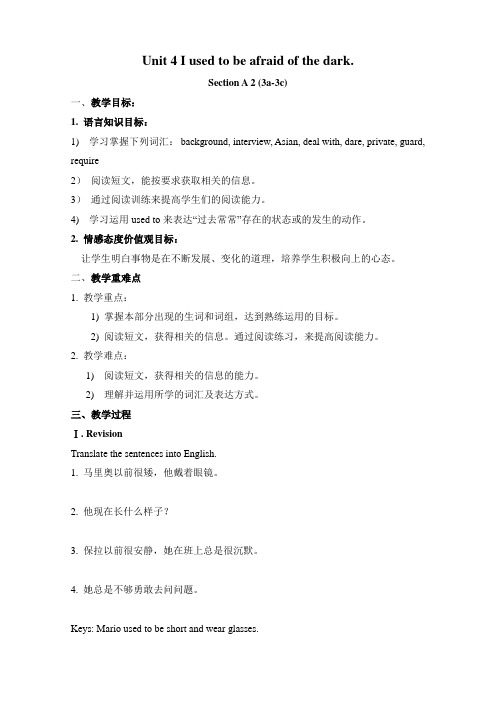
Unit 4 I used to be afraid of the dark.Section A 2 (3a-3c)一、教学目标:1. 语言知识目标:1) 学习掌握下列词汇:background, interview, Asian, deal with, dare, private, guard, require2)阅读短文,能按要求获取相关的信息。
3)通过阅读训练来提高学生们的阅读能力。
4) 学习运用used to来表达“过去常常”存在的状态或的发生的动作。
2. 情感态度价值观目标:让学生明白事物是在不断发展、变化的道理,培养学生积极向上的心态。
二、教学重难点1. 教学重点:1) 掌握本部分出现的生词和词组,达到熟练运用的目标。
2) 阅读短文,获得相关的信息。
通过阅读练习,来提高阅读能力。
2. 教学难点:1) 阅读短文,获得相关的信息的能力。
2) 理解并运用所学的词汇及表达方式。
三、教学过程Ⅰ. RevisionTranslate the sentences into English.1. 马里奥以前很矮,他戴着眼镜。
___________________________________2. 他现在长什么样子?___________________________________3. 保拉以前很安静,她在班上总是很沉默。
___________________________________4. 她总是不够勇敢去问问题。
___________________________________Keys:Mario used to be short and wear glasses.What’s he like now?Paula used to be really quiet. She was always silent in class.She was never brave enough to ask questions.Ⅱ. Warming up展示一张Candy Wang的照片,并询问学生们如下问题。
山东省临沂市青云镇中心中学九年级英语上册Unit2《Iusedtobeafraidofthedark》课件(1)
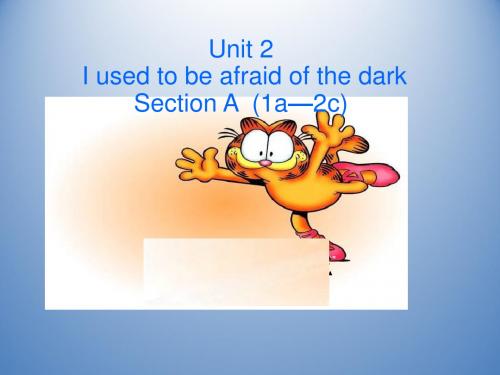
Look at the pictures about Yu Mei and fill in the blanks.
It seems that Yu Mei has changed a lot. She used to be ___ when she was younger, but now she is tall. She used to be ___, but now she has many good ___. I remember she used to play football, but now she likes playing ___. She used to have ___ ___, but now she grows it long. She looks more beautiful than before.
• 下面每个句子都有一处错误,请指出并 改正
• 1 Liu Mei used to being a good girl.___
• 2 She is used to stay up late. _____
• 3 The boy is interesting in that story. ____ • 4 They didn’t used to like eating pears.
My partner used to be afraid of…
My partner still afraid of…
A: Did you use to be afraid of the dark? B: Yes, I did. A: Are you still afraid of the dark? B: No, I’m not. How about you? A: Me? Oh, yes! I’m terrified of the dark. B: So, what do you do about it? A: I go to sleep with my bedroom light on.
新目标英语九年级第四单元I used to be afrai of the dark 说课稿
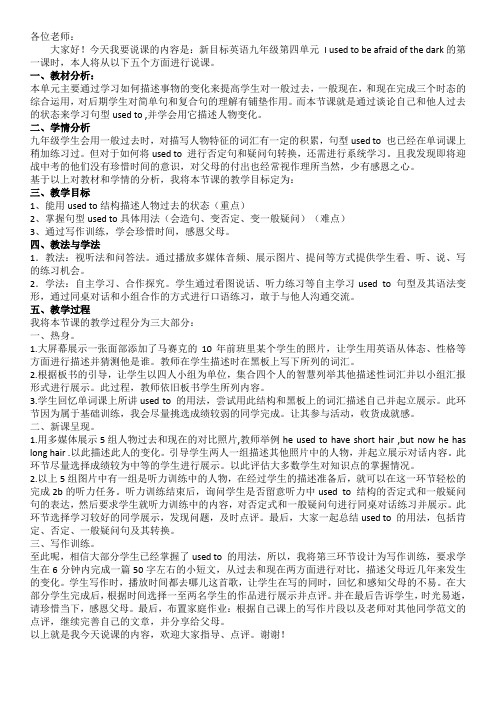
各位老师:大家好!今天我要说课的内容是:新目标英语九年级第四单元I used to be afraid of the dark 的第一课时,本人将从以下五个方面进行说课。
一、教材分析:本单元主要通过学习如何描述事物的变化来提高学生对一般过去,一般现在,和现在完成三个时态的综合运用,对后期学生对简单句和复合句的理解有铺垫作用。
而本节课就是通过谈论自己和他人过去的状态来学习句型used to ,并学会用它描述人物变化。
二、学情分析九年级学生会用一般过去时,对描写人物特征的词汇有一定的积累,句型used to 也已经在单词课上稍加练习过。
但对于如何将used to 进行否定句和疑问句转换,还需进行系统学习。
且我发现即将迎战中考的他们没有珍惜时间的意识,对父母的付出也经常视作理所当然,少有感恩之心。
基于以上对教材和学情的分析,我将本节课的教学目标定为:三、教学目标1、能用used to 结构描述人物过去的状态(重点)2、掌握句型used to具体用法(会造句、变否定、变一般疑问)(难点)3、通过写作训练,学会珍惜时间,感恩父母。
四、教法与学法1.教法:视听法和问答法。
通过播放多媒体音频、展示图片、提问等方式提供学生看、听、说、写的练习机会。
2.学法:自主学习、合作探究。
学生通过看图说话、听力练习等自主学习used to 句型及其语法变形,通过同桌对话和小组合作的方式进行口语练习,敢于与他人沟通交流。
五、教学过程我将本节课的教学过程分为三大部分:一、热身。
1.大屏幕展示一张面部添加了马赛克的10年前班里某个学生的照片,让学生用英语从体态、性格等方面进行描述并猜测他是谁。
教师在学生描述时在黑板上写下所列的词汇。
2.根据板书的引导,让学生以四人小组为单位,集合四个人的智慧列举其他描述性词汇并以小组汇报形式进行展示。
此过程,教师依旧板书学生所列内容。
3.学生回忆单词课上所讲used to 的用法,尝试用此结构和黑板上的词汇描述自己并起立展示。
九年级英语Unit2Iusedtobeafraidofthedark教案

九年级英语 |Unit2 1. uSed to do Sth. 冠 去常常做某專| |否定形式:didn ' t uSe 「to| do sth. |/ u|se|d hot to| dd sth.| |如:| He~used to play footb|all after school. 放学后h Will go to | Ching, Won | p| t she? | | 0|否定陈述句 + 肯定提问〕:|如:| She doekn ' t cGme fr6mChin|a, dobs |she?| Ybu |have n t|fiHished hbmeWoGk, haVe| ydu? I ③提问咅 词 不、 ' 陈述句中含有否定意义的词,如: little, few, n ever, hoth ing, | 丨hdrdly .等。
其反意疑问句用肯定式。
||如::. He knowd little EAgl shL dloek he? 丨 I 他一点 也不懂英语,丨不是吗?丨丨They hardly 口 understood |it,did they? ||~~他们几乎不明白,不是吗? 3. play the~piano 钢琴 4in terested| in dding sth.| 对做…感兴趣如 He iS inlte+eslted id Math, but he iSn ' t in|te^sted in |speaking | | |Ehglish. | 他对数学感兴趣,但是他对说英语 不感兴趣。
| | 5・Mterested Wdj.|感兴趣的,指人对某事物感兴趣,往往主语是人丨丨「 I :interesting adj.I I 有趣的,指某事物 | /1某人具 有趣味,主语往往是物I 丨6still 」|仍然,还. 用在 be~~动词的后面 |~~如: I ' m stilll astudent. 用在行为动词的前面 如:Istill ove him. 7. the dark 天黑,晚上,I am terrified of the dog. be terrified~ofdding sthl 如 I am terrified of speaking. 9.| on I""副词| 表示(电灯、电视、机械等)在运转中I / I 打开, 其反义词 off.① be in tefeSte0 M sth.对…感兴趣②be黑暗8.害怕…be terrifiedof衣着 He S P 6nd 3 monthS bUilding thebfidge. 他花费了三个月去建这座桥。
人教版英语九年级Unit 4《I used to be afraid of the dark》全单元
人教版英语九年级Unit 4《I used to be afrd of the dark》全单元教学设计一. 教材分析人教版英语九年级Unit 4的主题是“I used to be afrd of the dark”,主要讲述了人们过去和现在的变化。
本单元包括两个部分:Part A和Part B。
Part A包含一个听力任务、一个口语任务和三个阅读任务,而Part B包含一个口语任务、两个阅读任务和一个写作任务。
教材内容丰富,旨在提高学生听说读写四项基本技能,同时培养他们的文化意识和跨文化交流能力。
二. 学情分析九年级的学生已经具备了一定的英语基础,能够运用所学知识进行简单的交流。
但是,他们在词汇、语法和听力方面还存在一定的困难。
因此,在教学过程中,教师需要关注学生的个体差异,充分调动他们的学习积极性,激发他们的学习兴趣。
三. 教学目标1.知识目标:学生能够掌握本单元的重点词汇和语法知识,正确运用一般过去时描述过去和现在的变化。
2.能力目标:学生能够在不同情境下运用所学知识进行听说读写操作,提高他们的语言运用能力。
3.情感目标:学生能够了解并尊重文化差异,培养跨文化交流的能力。
四. 教学重难点1.重点:本单元的重点词汇和语法知识,以及一般过去时的运用。
2.难点:一般过去时的运用,以及如何在实际情境中进行跨文化交流。
五. 教学方法1.任务型教学法:通过完成各种任务,激发学生的学习兴趣,提高他们的实践能力。
2.情境教学法:创设真实的情境,帮助学生理解并运用所学知识。
3.交际法:鼓励学生积极参与课堂交流,提高他们的口头表达能力。
六. 教学准备1.教师准备:备好相关教学材料,如PPT、听力材料、阅读材料等。
2.学生准备:预习本单元内容,完成相关的自主学习任务。
七. 教学过程1.导入(5分钟)教师通过提问方式引导学生回顾上一单元学过的内容,激发学生的学习兴趣。
例如:“Do you remember what we learned in the last unit? How was your weekend?”2.呈现(10分钟)教师通过展示PPT或实物,呈现本节课的主题“I used to be afrd ofthe dark”,引导学生关注一般过去时的运用。
安徽省濉溪县城关中心学校九年级英语全册 Unit 4 I used to be afraid of the dark教案 (新版)人教新目标
Unit 4 I used to be afraid of the dark.Section A(1a----2c)【教学目标】——心中有了明确的目标,您就会走向成功!New words:Humorous , silent, helpful, from time to time, scoreKey expressions:used to do sth ,from time to time,Key sentences:’Paula used to be really quiet.I used to see him reading in the library every day.But now I’m more interested in sports【导学流程】一、【自学】——学会自学,您将技高一筹!1. 预习单词并理解意思写出下列单词1、有幽默感的;滑稽有趣的2、不说话的;沉默的3、有用的;有帮助的2、用所给词完成句子1、He is a very kind and rather man.2、The play was so that the audience laughed all through it.3、Would you be good enough to keep4、She is a girl.5、The dict ionary is very to your English study.2. 翻译下列短语1、过去常常2、时常;有时3、戴眼镜4、留着长直发5、害怕黑暗 5、在足球上7、Mario过去很矮吗?8、Mario过去常带着眼镜。
9、Tina常留着红而卷曲的头发。
10 、他现在什么样?11、你过去常常很文静,是吗?12、我过去不够勇敢问问题。
13、你过去常弹钢琴吗?二、【释疑】——认真阅读,您会明白很多!ed to do和be/get used to doing.①be/get used to 是“习惯于”做某事,to是介词,后面接名词或动名词,如:我已经习惯于这里的天气了。
人教新目标英语九年级《Unit 4 I used to be afraid of the dark》Revision说课稿
人教新目标英语九年级《Unit 4 I used to be afraid of the dark》Revision说课稿我说课的内容是人教新目标九年级英语Unit 4 I used to be afraid of the dark. 的复习课。
整个说课包括教材分析、学情分析、教学目标、教学重难点教法学法、教学设计和板书设计。
一、教材分析1.教材的地位及作用:本单元的核心话题为“talk about what they used to belike”,谈论人物外貌和性格变化这是七下unit9 what does he look like 延伸,以句型used to do 为主要学习任务,而used to do与九年级u5的 be used to do 以及U10的be used to doing的区别一直是教材重点和学生掌握的难点。
在考试当中,可以单选或听力形式进行考查。
因此,本单元内容在整个初中阶段教材中起着承上启下的作用二、学情分析:从知识储备来看,学生们在七下unit9 what does he look like中就学习了一些描述人物的词汇 tall, short, fat, thin long hair, short hair outgoing, serious 等。
从心理特点来看,学生对于谈论本人和他人的变化话题比较感兴趣,但就我们班而言,学生自觉性差,不能做好课前预习和课后复习,所以课堂复习要细。
三.教学目标义务教育阶段英语课程的总目标是:通过英语学习使学生形成初步的综合语言运用能力,而就九年级而言,能就日常生活中的各种话题与他人交换信息并陈述己见。
根据提示写80词以上小作文根据课程的总目标和本单元内容在整个初中阶段的地位,结合本节课的教学内容,结合我们具体的学情,我制订了如下目标:1、知识目标:学会使用used to 结构谈论自己及他人过去与现在的变化并能口头作文2、能力目标:依托本单元的语言素材培养学生善于听说、乐于听说的良好习惯和学习能力。
九年级英语全册Unit2Iusedtobeafraidofthedark单元综合检测试题无答案人教新
河南省开封市第三十三中学九年级英语全册 Unit 2 I used to be afraid of the dark单元综合检测试题(无答案)人教新目标版Ⅰ.词汇万花筒。
(15分)A.根据句意及首字母提示填入适当的词。
(5分)1. He should be a_________ to come into the room.2. He is s_______ because he often does foolish thin gs like this.3. He often c______ with his friends on the Interne t.4. I want be a v______ in the Olympic Games 2008 of Bei jing.5.Marry ha s her ears p .She wants to wear earrings .B.用所给短语的适当形式填空。
(10分)chat with stay up be interested in pay attention to give upⅡ.语法竞技场。
(30分)A .选择填空:(10分)1. Sixteen-years-olds shouldn’t ______ to go to an Internet bar.A. be allowedB. be allowC. allowD. are allowed2. _____ middle school students allowed to use mobile phone at school ?A. DoB. DidC. AreD. Can3. I don’t think teenagers should be allowed to drive , because they are _____.A. not enough seriousB. not serious enoughC. too seriousD. to serious4. Many students will be ______ if the class is boring.A. sleepB. sleepyC. sleepingD. slept5. The National Day is coming , we’ll have 7 days ______.A. onB. offC. upD. down6. --- I have a lot of rules at home. ---- _________.A. So is Peter.B. So Peter has .C. So does Pete r.D. Neither Peter has7. The granny is ______ , but she doesn’t feel _____ .A. alone, aloneB. lonely, lonelyC. alone, lonelyD. lonely, alone8. You should the new words that you don’t know how to spell.A. look forB. look afterC. look upD. look down9. I hope I can have _____ opportunity ______ in the 2008 Olympic Games in Beijing.A. a; volunteerB. an; to volunteerC. a; to volunteerD. an; volunteer10. Hi s son is only four years old. He is ______ to go to primary school this year.A. enough oldB. too oldC. not old enoughD. young enoughB.根据括号内的要求,改写下列句子。
- 1、下载文档前请自行甄别文档内容的完整性,平台不提供额外的编辑、内容补充、找答案等附加服务。
- 2、"仅部分预览"的文档,不可在线预览部分如存在完整性等问题,可反馈申请退款(可完整预览的文档不适用该条件!)。
- 3、如文档侵犯您的权益,请联系客服反馈,我们会尽快为您处理(人工客服工作时间:9:00-18:30)。
★ used to do 过去常常做某事 例:Jim used to play football after school. I / he/ she/ used to be +形容词 used to do (动词原形) 表示过去曾经…(现在不这样了) 其否定形式:used not to /didn‟t use
My six-year-old brother started school this week.
诸如six-year-old这样的复合形容词常作定
语,并且其间的名词用单数形式,名词之间用 连字符连接. e.g. The Sutong Highway, a B_____ bridge,is already open to traffic. A.32 kilometer long B.32- kilometerlong C.32 kilometers D.32- kilometers-
相当于no more She would not leave her baby anymore.
She would leave her baby no more.
★ spend + (时间或金钱)+
(in) +doing sth
on sth on She spends most of her money ___ new clothes. buying She spends most of her money (in)______ (buy) sb clothes. ※It takes new some time to do sth
I’m afraid that Jim will miss a
lot of his lessons.
恐怕Jim会缺很多课。
③错过
I missed catching the 2:15 train.
我未赶上2点15分的火车。
6.chat with … 和…聊天
Explanation
I’m on the swim team. 我是游泳队成员。 类似的说法还有:I’m on the soccer team 或I play on the soccer team.
2. right Then I go right home and eat dinner. right在这里是副词,意为“直接 地”。 如:The wind blew right in our faces. 风迎面吹来。
have to意为“必须”, 侧重于 客观上的必要。 其句型为have (has) to+动词原形 如: We have to leave now. He has to work on Sunday. I had to do my homework last Sunday.
4. hardly ever These days, I hardly ever have time for concerts. hardly ever = very seldom.很
少
He hardly ever goes to bed
before midnight.
他很少在午夜以前就寝。
5. miss I really miss the old days. ①miss在这里为“怀念”的意思。 How he misses his mother while she is away in London! 他妈妈在伦敦期间,他多么想念 她啊! ②此外miss还有“缺”的意思。
miss be afraid of used to worry about
1. am afraid of I know howworry about to swim.
have to
the sea.I don’t
2. Don’t things so much.It will make you stressed out. have to 3. Sorry, I can’t join you.I miss study for test. 4. I really used to moved to another town. my friend Tina.She
※Sb spends some time /money doing sth Sb spends some time /money on sth ※Sb paid money for sth. ※Sth cost +money/Sth cost sb +money.
paid 1. The boy ____100 yuan for a basketball last cost week. took 2. The English book ____the boy 50 yuan yesterday. 3.用took ,spent about two cost 填空 It ____them , paid , days to finish the work yesterday. ◎I paid 10 yuan for that book. _____
Explanation
1. these days “…but these days I get up early and stay in school all day.” these days是个词组,意思是“现 在,这几天” Your son’s trouble is very common these days.
Be terrified of = be afraid of
2. I go to sleep with my bedroom light on. 我睡觉要卧室的灯亮着。 On 为副词,意为”开着或出于工作状态中 e.g.这台机器日夜运转. The machine is on day and night.
※ Then dinner.
I go right home and eat
right“一直、笔直”means “straight”
e.g. The bus will take you right
※
I used to chat with my grandmother. chat with 与某人闲谈 ※ I hardly every have time for the concerts. “ have time for” 有时间做某事 means “ be free for” ※ I really miss the old days. miss:①想念 例:I „m missing my
Explanation
People sure change.
人们的确是要变的。
sure在这里为副词。
如:It sure was cold.
天气确实很冷。
短语:wait a minute
Be interested
Explanation
1.I’m terrified of the dark. 我害怕黑。
C
B to practice D in practicing
C on practicing
(
)4.--Now, I have a ___homework to do every
( B )5.Do you mind ___ the door? A open B opening C to open D opens ( A )6.You needn’t worry ___ your son. He can take care of himself.
A about
B ofΒιβλιοθήκη C atD on( C )7.Don’t ___ the last bus . Please be quick. A take B catch C miss D lose ( C )8.Our teacher often ___us after class. A chat with B chat to C chats with D chats to
to… 其疑问句形式:Used +主语 to? /Did+ 主语 +use to…?
注意区别:used to do和 doing(习惯于)
`
be used to
He used to like swim last year.
他去年喜欢游泳.
He is used to getting up early.
他习惯于早起.
1.我年轻时个子很矮。1. I used to be short when I was youn 2.你过去是直发吗?是的。 —Did you use to have straight hair? —Yes, I did. 3. 你过去弹钢琴吗?不,我不弹。 —Did you use to play the piano? didn‟t. 4. 我过去害怕黑暗。 —No, I
spent ◎She ____
◎It cost ____
100yuan on her dress.
her ten dollars.
◎Ittook ___
her ten hours to finish it.
※ I used to have so much time.
so “这么、那么” 如果名词前有many、 much、few、little时用so。如果是其他形容 词修饰名词则用such.
I used to be afraid of dark.
5. 你过去害怕独自一人呆着吗? —Did you use to be afraid of being alone? —Yes, I did. 6. 我过去走着上学。 I used to walk to school.
★ not…anymore (即not…any more) 不 再…
(D
)1.Jim spent two hours ___that house. B draws C draw
